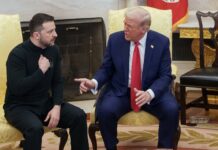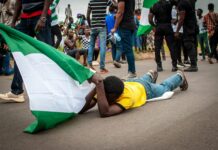Over the last few years, we have seen an increase in the level of insecurity and instability all across the Sahel region. For the better part of a decade, West African nations in particular have essentially been in a perpetual state of war against armed militants operating in the region. It is difficult to characterise this as anything other than a war when large swaths of our countries have fallen out of the hands of our governments and are now under their rule of militants.
This conflict has led to massive levels of displacement, destruction, and an increase in political instability in our countries as well. So much so that we saw a spike in the number of coups and coup attempts in the last few years, putting into power a series of military juntas in the Sahel states in particular. On the 24th of May 2021, Mali’s Interim President would be deposed in a coup led by his Vice President, Assimi Goïta. This came just a few months after the 2020 coup d’etat, which ousted President Ibrahim Boubacar Keïta.
In September 2021, a military coup in Guinea ousted President Alpha Condé, the first democratically elected president of Guinea. In January 2022, a coup in Burkina Faso would depose President Roch Kaboré and install Paul-Henri Sandaogo Damiba as Interim President. However, a few months later, in September 2022, Damiba was ousted by Ibrahim Traoré. Then finally, in July 2023, a coup in Niger would oust President Mohamed Bazoum.
You do not need to be an expert on conflicts or geopolitics to understand that this has been a major crisis for West African states. This meant that now 4 of ECOWAS’s 15 member states were under the rule of military juntas. Between 2021 and 2023, it seemed like West African governments were falling to coups one by one. Things would eventually calm down, though, and we haven’t seen another successful coup among ECOWAS nations since the July 2023 coup in Niger.
However, in the midst of all this chaos and instability, one man has managed to capture the attention and admiration of many young Africans. That is Captain Ibrahim Traoré, the leader of the Military Junta in Burkina Faso. During his reign as leader of Burkina Faso, he has reached celebrity status among many on social media. He has been portrayed as a revolutionary leader bringing prosperity to Burkina Faso while standing up against France and the United States.
If you were to believe everything you read about Ibrahim Traoré online, you would be under the impression that within the short time he has been the leader of Burkina Faso, he has managed to transform the country into the very best place to live on the African continent. All over social media, there are thousands of posts that receive thousands of likes and engagements praising Ibrahim Traoré for all sorts of policies he is supposedly putting in place within Burkina Faso.
One of the latest iterations of this that has gone viral on social media is that Ibrahim Traoré has just made all education from primary to even tertiary education free for all Burkinabé in the country. Moreover, just the other week, I remember seeing reports that all students in Burkina Faso would begin to receive a salary of 100,000 CFA to support them throughout their studies. However, you would only have to do just a little bit of critical thinking to understand that none of this can possibly be true.

How is it that the government of Burkina Faso can afford to send every single citizen through primary school, secondary school and university, when Burkina Faso is considered to be one of the poorest countries in the world? Especially when you consider that Burkina Faso is currently fighting an existential war against insurgents in their country, which currently controls close to half of Burkina Faso’s land. This is only one of many examples of blatant propaganda about Burkina Faso that is spread on social media that can easily be disproved with just a little bit of scrutiny.
But if you thought that it would be impossible for the government to possibly pay for every citizen’s education already, that is only scratching the surface on the online narrative that has been spread about Burkina Faso. In a first for Africa, it has been reported that Burkina Faso has successfully been able to design its own electric vehicle that is 100% produced within Burkina Faso. This vehicle can allegedly travel up to 330 kilometres with a full battery and only takes 30 minutes for it to fully charge. Now, no one outside Burkina Faso has ever seen this newly designed electric vehicle in person or ever driven it, but it is definitely real.

If you think developing an electric vehicle is impressive, that is not even the most impressive thing the military junta under Ibrahim Traoré has managed to accomplish. If you follow all the propaganda put out in favour of the Ibrahim Traoré government, you would be led to believe that Burkina Faso has somehow managed to pay off all of its national debts and has abolished taxes for all its citizens.
And the way they have managed to do that, (supposedly) was by nationalising all of their mines and using the capital gained from the sale of their resources to fund all these policies. (A truly novel idea no one has ever thought of or tried before.) If you were to question the legitimacy of any of these claims, you would be accused of being too dumb to understand how it works, or you would be accused of having too much of a colonial mindset to not believe that Africans can do well economically by Ibrahim Traoré’s stans.
Another one of the main strategies Ibrahim Traoré has used to promote himself has been by demonising the West, specifically France and the United States, at every possible moment. He has on multiple occasions accused Western countries of taking advantage of Africa. In so doing, he portrays himself as the person triumphantly fighting back against exploitation by Western nations for the betterment of his people.
This strategy of demonising Western nations also allows him to place the blame on them for supposedly plotting against him and his regime. On multiple occasions, he has accused the French and American governments of plotting to overthrow his government and/ or of alleged plots to kill him, all for standing up for his people. And Traoré has said on multiple occasions portrayed himself as being willing to die if it meant that was the price he was to pay for fighting for his people.
Now, while it is certainly true that Western nations like France and the United States do seek to gain influence in West Africa, in the same way that Russia or China or any other major power would seek to gain influence in foreign countries. It is just the reality that foreign governments do attempt to influence things in Africa and across the world. However, Ibrahim Traoré has not provided any proof that there have been any foreign plots to overthrow his government.

To say definitively whether or not there have been foreign plots against him is not possible, but what is obvious to anyone is that Ibrahim Traoré clearly sees the value in portraying himself as a victim of Western nations. In so doing, he portrays himself as a martyr, which only causes him to gain even more support among Africans. Particularly those who already have a very negative or sceptical view of Western nations in general.
However, what is the truth behind the facade that has been put out about Burkina Faso under Ibrahim Traoré? The truth is that Burkina Faso is currently engaged in a existential war against militant groups operating within its borders. According to most estimates, around half of Burkina Faso territory is currently under the control of these militias and the military has struggled to take back control of these lost territories.
Moreover, Ibrahim Traoré’s grip on power is not at all secure. Almost every week it seems, there is a new report of an attempted military coup against Traoré by members of the military. One can only imagine how dysfunctional and how much distrust there must be behind the scenes within the military junta for there to be so many instances of attempted mutinies against Ibrahim Traoré’s rule.
Meanwhile, on the ground, life for the average Burkinabé is not much better. Communities outside of the capital Ouagadougou especially have been the ones the most affected by the fighting against the militants. Last year, we learned of the Barsalogho massacre, the deadliest in Burkina Faso’s history, that took place over the course of multiple hours which saw around 600 civilians killed by Jihadist militants.
Moreover, Human Rights Watch (HRW) has documented massacres taking place against civilians by pro government militias, in a report that came out this year, in March 2025. Additionally, last year HRW would also document a massacre against civilians in a village that had taken place by the Burkina Faso military itself, which reportedly unfolded on the 25th of February 2024. HRW reported that the massacre against civilians had taken place by the military in retaliation against villagers’ it alleges aided jihadists militants.
So that means that the Burkinabé military, which is supposed to be responsible for protecting civilians allegedly took part in a massacare against them. Even if the allegation that the villagers aided jihadist militants were true, that is still completely unjustifiable. Its not as if a small group of villagers have the ability to stand up to a group of jihadist militants on their own anyway, so who is to say that they may have aided them voluntarily.
In response to the coverage of the massacre by the military, the junta would suspend and expel foreign media from operating within Burkina Faso. Which should tell you all you need to know about the state of the country. If things were going as well as you see on social media, why hide it from international media? This tells you that the Junta wished to be able to have full control of the narative that comes of Burkina Faso, so they can spread all kinds of propoaganda without any kind of push back.
Typically, when you think of Africans falling for government propaganda, you would normally think that it is older Africans or uneducated Africans that would be more susceptible to these forms of manipulation. However, when you look at the people who are most influenced by these stories coming out of Burkina Faso it is overwhelmingly Africans who are very online, which demographically tends to skew more towards younger, educated Africans. Yet, they seem to be embracing this false image that has been put out about Ibrahim Traoré and the state of Burkina Faso.
It is quite easy actually to understand the appeal of Ibrahim Traoré. So many Africans, especially younger generations, have become so disaffected with the state of our governments that they have begun looking for alternatives. A common trope, I have commonly observed among Nigerians for example, is the idea that all we need is a truly good man who can come along to end corruption and fix our country. People want to have a figure that they can put their faith in to fix everything in our broken systems.
Ibrahim Traoré portrays himself as an outsider that is taking on corruption in Burkina Faso and taking on Western nations that have exploited Africa’s resources, and many have embraced him as a result. However, the reality is that this narrative falls apart at even the tiniest bit of scrutiny. But many still choose to stick with this delusion because the truth about Ibrahim Traoré may be too difficult for them to come to terms with.
That truth being that, there is nothing new or revolutionary about Ibrahim Traoré (as if West Africa has never seen a charismatic leader take power after a military coup before). In fact, this brand of authoritarianism is all too common around Africa. If anything, when you consider there has never even been a peaceful transfer of power in Burkina Faso’s post-colonial history, one could argue that Captain Ibrahim Traoré’s rise to power is just a continuation of the struggle for power among the elites within Burkina Faso’s society.
The thing that would really be revolutionary, instead, would be an embrace of democratic values. The best way for us to fight corruption in our countries would be by having democratic institutions in place so that our politicians understand that they would be held accountable for their actions when they are in office. A system where elected officials actually work for their constituents, rather than them abusing their positions to enrich themselves.
The biggest takeaway from this whole saga is that any one of us can fall prey to propaganda. No matter how educated, informed, or social media savvy we think we are, we’re all susceptible. That’s why it’s more important than ever to approach online narratives with a healthy dose of skepticism and critical thinking.












